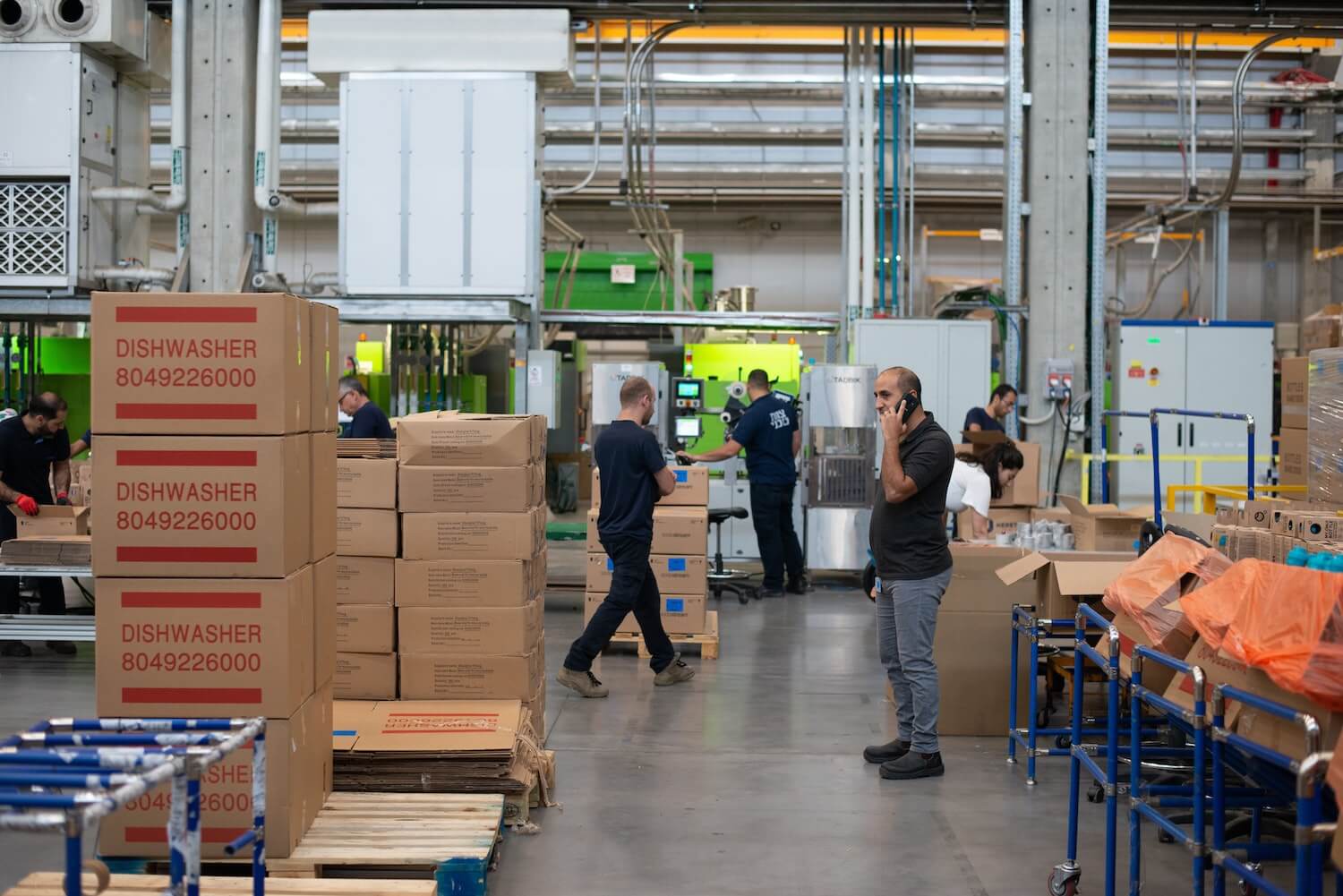Table of Contents
** Minutes
Demonstrating an appreciation for the toughness of the role
Attracting talent to warehouse roles takes a multifaceted approach
According to the US Bureau of Labor statistics, there were 589,000 job openings in the warehousing and logistics industry in September 2021.
Despite the demand, warehouse roles are currently one of the hardest types of positions to fill in the country.
There are a couple of key reasons why warehouse roles continue to be difficult to fill. For one, the sheer growth of consumer demand for buying products online means that employers must hire far more warehouse employees than are currently available, leading to a labor shortage.
An additional reason is the reputation of warehouse roles as being undesirable jobs. This reputation has only been exacerbated by the horror stories told about overstretched workers in Amazon fulfillment centers post-pandemic, in which people are searching for flexibility at work. To address these challenges and change perceptions, companies can leverage innovative AI based recruitment tools. Advanced AI-powered features that streamline the hiring process, making it easier to find and attract top talent for warehouse roles.
In this article, I’ll go over some of the strategies United Tires, a nationwide retailer of used and new tires, has implemented to attract warehouse talent during the pandemic and beyond.
Demonstrating an appreciation for the toughness of the role
There is no getting around the fact that warehousing positions are often physically demanding, repetitive, and are (on average) more dangerous than office-based jobs.
Companies that hire warehouse employees must therefore directly address the downsides of the job through how they recruit, manage and compensate employees in these positions.
Here are some ways you can do this.
1. Offer a salary that reflects the demands of the role
The simplest way to offer a salary acknowledging and appreciating the demands of the role is to offer warehouse employees a competitive hourly wage.
You risk putting warehouse employees in dangerous situations by making them work more than 40 hours a week, so their hourly wage needs to be high enough to ensure that they won’t have to depend on overtime to provide a comfortable lifestyle.
Recent studies estimate that the average warehouse employee earns around $16 per hour. When working a 40 hour week, this still puts warehouse operatives well under the national average wage, so you may want to consider paying warehouse employees more than $16 per hour.
At United Tires warehouses, we pay workers $19 per hour and cap our maximum amount of working hours a week to 45 hours.
Although the pressure to maintain a lean supply chain at a low cost may tempt you to run your warehouse as cheaply as possible, the salary that you offer warehouse workers will most likely have the largest impact on how easily you can hire these types of staff.
Therefore, if you struggle to find warehouse talent, the easiest way to improve your recruitment process is to rethink salary offerings.
2. Spread the more physically demanding tasks across your team
The way that warehouse workers are managed should also demonstrate an appreciation for the physical demands of the profession.
Warehouse operatives will have to undertake a number of different tasks throughout the working week.
Some of these tasks, such as loading and unloading shelves and pallets and packing up boxes, will be more physically demanding than more cerebral roles such as physical inventory counts and data entry.
Warehouse managers might want to consider spreading physically demanding work across team members more evenly.
Although each operative will have their own strengths and weaknesses (and managers should have some license to play to each employee’s strengths), having one or two team members do all of the more physical work is unfair to both the employee and the team as a whole.
If you’re a more senior logistics manager, consider keeping rosters and checklists of which team members are doing what tasks on any given day to ensure that work is being distributed fairly.
3. Offer benefits that directly remedy problems caused by working in a physical role
Employees who work for a long period of time in a physically demanding role are more likely to have certain physical health problems.
Companies that employ people in these roles should therefore offer support and benefits that help prevent these health problems from occurring, while also providing easy access to appropriate healthcare if these problems do arise.
Such benefits can include:
- An increase in paid leave
- Free sessions with a physiotherapist or occupational therapist
- Comprehensive health insurance
- Free gym membership
Offering these types of benefits can have the triple positive effect of reducing the number of days that your employees may have to take off due to illness or injury, improving workplace morale in your warehouse, and making warehouse roles more appealing to candidates.
4. Try to make warehouse roles as flexible as possible
One of the main reasons why warehouse roles are currently seen as undesirable jobs is because there is minimal potential for employees in these positions to work from home.
This aspect of the role has become even more apparent since the rise of remote working due to the pandemic.
Although many of the more hands-on operative roles in warehouses will never be able to be performed remotely, the fact that warehouses often need to operate 24/7 (particularly if you are running an ecommerce business) means that you can offer staff flexibility in their working hours.
Although flexible working is not the same as working from home, it does include some of the benefits that remote workers enjoy.
Some options that warehouse managers can offer their operatives to provide more flexibility in their working hours include:
- Giving rota priorities to parents of young children so they can be away from working in the early morning and/or early evenings.
- Limiting the maximum amount of anti-social hours (evening and weekends) that an employee is required to work.
- Offering financial incentives to people who are willing to work extra anti-social hours. Young people in particular are often happy to work regular evenings and weekends in return for a little extra income.
Warehouse managers should also set up a system where operatives can easily swap shifts between each other, which provides more flexibility and can help build camaraderie.
5. Make your warehouse as “temp-friendly” as possible
Due to the fact that there are often plenty of entry-level positions in warehouses, warehouse operative roles are often very popular among temporary workers who are looking to work on short-term, flexible contracts.
Companies that hire warehouse employees should look to capitalize on this market by making their job listings appealing to temporary workers, and by making it as easy as possible for temporary staff to slot into warehouse roles.
Marketing warehouse roles to temporary workers
In marketing your warehouse roles to temporary workers, hiring managers should do the following:
- Place job advertisements on as many temporary-role specific job listing platforms as possible.
- State specifically in your job advertisement that the position is suitable for temporary workers, and specify a minimum amount of time that an employee must commit to a role for them to be eligible for it.
- Work with specialist temp recruiters if possible.
- State your offered compensation per hour on your job advertisement. Temporary workers tend to consider their compensation as an hourly wage rather than an annual salary, so frame it to them as such.
Integrating temporary workers into your team
Your success in working with a consistently churning stream of temporary staff depends on a business having the right types of onboarding and systemization in place.
You need a firm understanding of how long it takes people to learn how to do specific tasks, and then temporary staff should only be given responsibility for tasks that are appropriate for the length of time they will be working at your company.
If you take on temporary staff regularly, then it might be worth having a dedicated team member who oversees, onboards, and manages short-term hires.
It is also worth working together with other local warehouses to create a pool of reliable temporary workers that everyone can draw upon when required.
Not only does this increase the amount of potential temporary staff at your disposal, but it also makes a temporary role at your warehouse more appealing to candidates with the potential to be referred to other warehouses for more work in the future.
6. Offer career progression to your warehouse operatives
You are far more likely to attract talent to your warehouse floor if candidates believe that taking such a job can lead to opportunities higher up in your company in the future.
Warehouse operators will therefore find hiring much easier if they offer a clear pathway from operative roles to middle and senior management positions.
Doing this creates another win-win situation for a company and its employees, as employees have increased opportunities for career progression, while the company benefits from a shorter hiring process and a ready pool of qualified candidates with a deep understanding of ground-level issues.
Some ways that companies can create this pathway from operational to management roles include:
- Requiring that a certain proportion of applicants to a management role comes from within a company.
- Setting up a mentoring program where warehouse operatives spend time directly with senior managers across the business.
- Allowing warehouse operatives to have “secondments” where they can spend a short period of time (anywhere from a couple of weeks to a month) working in other roles in the company.
- Having a management structure among operatives (such as team leaders) which can then be used as a springboard into management positions in the future. Enhance this process by optimizing team performance with management software for streamlined communication and efficient collaboration.
You should also be looking to create case studies out of individuals who have climbed up the career ladder from an operative role in your company. These can be used to market warehouse operative positions in your organization going forward.
7. Make your job advertisements as appealing as possible to candidates
When writing up job postings for warehouse roles, you need to make sure that you directly address the objections that candidates may have in working in such a role.
A good job description that tells a candidate exactly what they are getting themselves into, while still explaining why the role is a better option than their competitors.
As we have already discussed, some of the main objections include:
- Low pay
- Physically demanding and potentially dangerous work
- Repetitive tasks
- Lack of flexibility
- Limited career progression in the long run
In order to overcome these objections, job listings should:
- Include the position’s salary.
- State the physical aspects of the job and an estimate of how much time will be spent doing physically demanding tasks
- Say what provisions are in place to protect employees’ health, safety and well-being.
- Be transparent about how sociable the hours are, and explain what procedures are put in place to minimize the number of anti-social hours worked.
- Say what policies exist to support an applicant’s long-term career objectives, using real-life examples of this wherever possible.
In short, a good job listing tells a candidate exactly what they are getting themselves into, while still explaining why the role is a better option than their competitors.
It is up to company policymakers to create a supportive and humane working environment that will be a good option for candidates.
Attracting talent to warehouse roles takes a multifaceted approach
To attract talent to your warehouse roles, you need to genuinely make your warehouse a worthwhile place to work in.
This involves paying staff a decent salary, offering them benefits befitting the work they do, and giving them career opportunities.
If you get these right, then hiring should look after itself.
Utilize a WMS your employees will love
Having best-in-class tools that are intuitive and easy to use are important for your warehouse employees.
ShipBob’s WMS is an all-in-one platform that helps your team gain better visibility into warehouse, order, and inventory data, as well as reporting and analytics — not to mention its user-friendly interface makes it easy to navigate.
Learn more about ShipBob’s WMS by connecting with our team.



